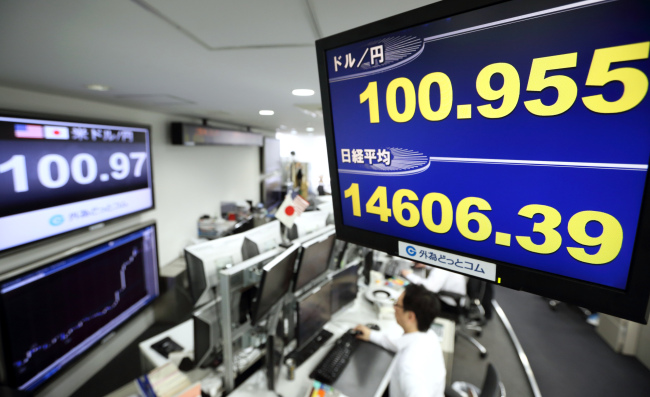Japan’s weak yen would continue to affect major Korean exporters following Shinzo Abe’s landslide victory in Japan’s national elections on Sunday, as he is likely to push ahead with “Abenomics,” aggressive monetary policies and fiscal stimulus spending, industry watchers said.
According to local economists including Jung Kyu-cheol of the Korea Development Institute, “Japan may continue its weak yen policies in a bid to reach its 2 percent inflation target and to recover from its prolonged economic slowdown.”
According to local economists including Jung Kyu-cheol of the Korea Development Institute, “Japan may continue its weak yen policies in a bid to reach its 2 percent inflation target and to recover from its prolonged economic slowdown.”

Global investment banks including Goldman Sachs, J.P. Morgan and BNP Paribas have also predicted in a recent report that the yen would continue to fall to as low as 124 yen per dollar next year from the current 110 yen level.
If the weak yen continues, it will negatively affect the already-suffering Korean major exporters in industries directly competing with Japanese counterparts.
“If the yen against the dollar reaches as low as 125, Korean exporters in the automobile, steel and shipbuilding industries will suffer a severe blow,” said Tokyo-based Nomura Securities in a recent report.
Korea’s major car manufacturers, Hyundai and Kia Motors, are already losing their overseas market share to Japanese companies. Korean cars, which used to be much cheaper than Japanese cars, are now selling for higher prices due to the weak yen.
Korea’s shipbuilders, which once dominated the global market, have Japanese companies close on their heels on the back of the weak yen and a string of mergers in the industry.
According to Clarkson, London-based research company, the global market share of local shipbuilders declined to 28.4 percent in November this year from 30.5 percent last year. On the other hand, Japanese companies rose to 19.7 percent from 17.4 percent during the same period.
Also in the construction and plant industries, Korean companies saw a big drop in their profits as a growing number of Japanese firms are bidding for overseas projects at low prices. According to the Land Ministry, profits of the Korean construction companies dropped to $10 billion during the January-September period from $19.7 billion in the same period last year.
In a bid to help the weakening Korean exporters, some analysts called on the government to take stronger monetary measures.
“The weak yen policy is expected to continue for the next two years during Abe’s term. Financial authorities should take stronger measures to support exporters by lowering the key rate and expanding money supply,” said Lee Ji-pyong, a researcher at LG Economic Research Institute.
By Shin Ji-hye (shinjh@heraldcorp.com)



![[Herald Interview] 'Amid aging population, Korea to invite more young professionals from overseas'](http://res.heraldm.com/phpwas/restmb_idxmake.php?idx=644&simg=/content/image/2024/04/24/20240424050844_0.jpg&u=20240424200058)
















![[Today’s K-pop] Kep1er to disband after 2 1/2 years: report](http://res.heraldm.com/phpwas/restmb_idxmake.php?idx=642&simg=/content/image/2024/04/25/20240425050792_0.jpg&u=)